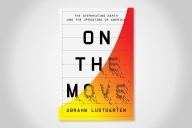You have /5 articles left.
Sign up for a free account or log in.
The Price of Prosperity: Why Rich Nations Fail and How to Renew Them by Todd G. Buchholz
Published in June of 2016.
Can I convince my politically progressive friends to give a conservative book a chance?
Would you still consider reading The Price of Prosperity if I told you that you will disagree with many of the arguments and opinions in the book, but that you will also learn some new things?
In The Price of Prosperity, Buchholz (the former Director of Economic Policy under George H.W. Bush), has an interesting argument to make. He believes that as a countries get wealthier they also start making decisions that will ultimately stall future economic growth. Buchholz main concerns are low fertility, the decline of labor force participation, and the loss of common values and shared purpose.
The “no baby, no future” argument has been made in other places - see What to Expect When No One's Expecting: America's Coming Demographic Disaster, - although Buchholz is particularly good at outlining the bleak future of very low fertility countries. Replacement level is about 2.1 children per women (the total fertility rate - TFR). The U.S. has a current TFR of 1.87. (Depending on immigration for population growth - and Buchholz is very pro-immigration). Russia’s TFR is 1.6, China’s is 1.6 (a country that will not get rich before it gets old), Italy’s is 1.43, Japan’s is 1.4, and South Korea’s is 1.25. More adult diapers are sold today in Japan than baby diapers - a future that many rich nations will also share. Where low fertility nations will find the workers necessary to pay taxes and social insurance benefits is a good question. Those of us working in higher ed should be asking questions about where our future students will be coming from.
I was with Buchholz in his chapters on fertility and work. (The decline of labor force participation rates over the past 8 years or so is truly astonishing).
Where I parted ways with his thinking was when he started talking about the impact of culture on economic growth.
You should make your own judgments, as Buchholz is always smart and provocative - if (to my ears at least) not always convincing.
Buchholz's chapters on Alexander the Great, Turkey, Japan, and Israel - all written to illustrate the connections between culture and economic growth - are lively and interesting. I didn’t quite get how these chapters connected with Buchholz’s arguments about U.S. fertility, immigration, and labor market trends - but I admire the attempt at lateral thinking.
How often do you read books that you know will diverge from your own ideas, viewpoints, and beliefs?
If you are on the moderate-to-liberal spectrum, how likely is it that you will pick up a book written by a conservative? Same question in reverse for the politically conservative amongst you.
My book reading tends to skew, I think, from moderate-to-progressive perspectives. More Piketty, Putnam and Krugman, less Murray, Laffer and Friedman. You can check out the covers of my audiobooks to see if my reading predilections are more ideologically diverse than I fear.
Some exceptions: I thought the conservative historian Niall Ferguson’s 2009 book The Ascent of Money: A Financial History of the World was great. I’ve also been a longtime fan of Tyler Cowen, and really liked Average Is Over, even though I disagree with almost everything Cowen says about politics.
There must be other books that I have read, and would recommend, that are written by conservatives. How can I figure this out?
Can you name some books that are written by people with politics different from your own - but that you still recommend?
Can you name some books where you disagree with the main arguments and conclusions, but that you still recommend?
What are you reading that you disagree with?
What are you reading?








